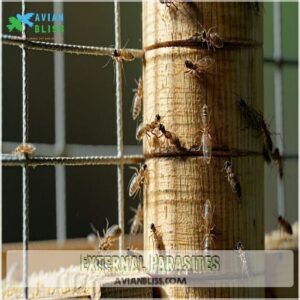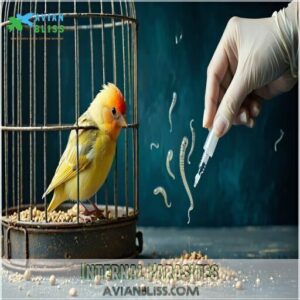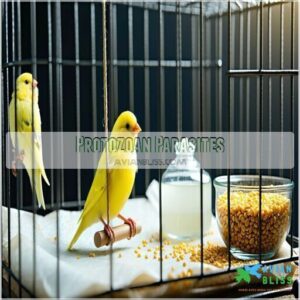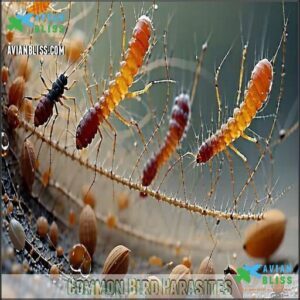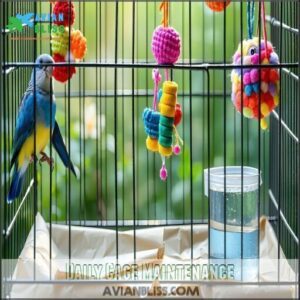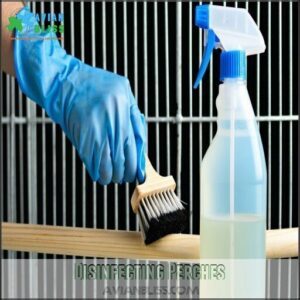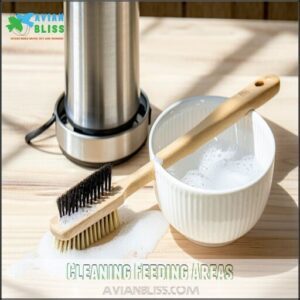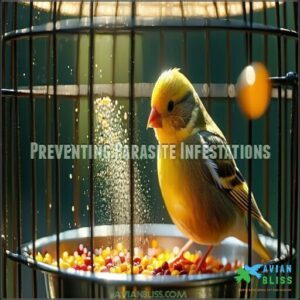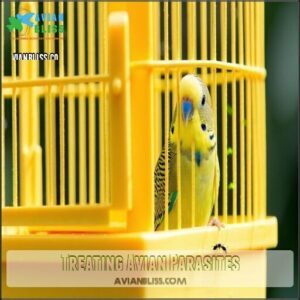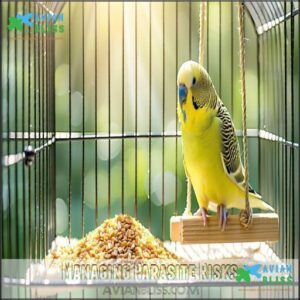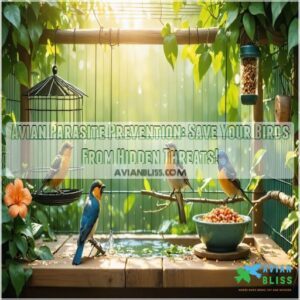This site is supported by our readers. We may earn a commission, at no cost to you, if you purchase through links.
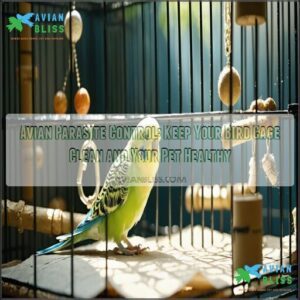
Clean food and water containers daily, and do a deep cage scrub weekly with avian-safe disinfectants. Don’t forget those hidden corners where mites love to party!
Regularly check your feathered friend for signs of parasites: excessive scratching, feather loss, or unusual droppings.
Line cage bottoms with clean paper and change it frequently to prevent parasite eggs from hatching.
If you suspect an infestation, isolate affected birds immediately and consult an avian vet.
The right preventative routine isn’t just cleaning—it’s creating an environment where parasites simply can’t set up shop, which is key to effective parasite control and maintaining a healthy environment for your bird.
Table Of Contents
- Key Takeaways
- Avian Parasite Types
- Bird Cage Cleaning Methods
- Preventing Parasite Infestations
- Treating Avian Parasites
- Managing Parasite Risks
- Frequently Asked Questions (FAQs)
- How to get rid of tiny bugs in a bird cage?
- How do you treat mites in caged birds?
- How do you clean poop off a bird cage?
- How long can parasites survive without hosts?
- Can birds develop immunity to certain parasites?
- Are some bird species more parasite-resistant?
- How do seasonal changes affect parasite activity?
- What role do beneficial microorganisms play?
- Conclusion
Key Takeaways
- You’ll need to clean your bird cage daily (food and water containers) and weekly (deep scrub with avian-safe disinfectants) to prevent parasites from establishing themselves in your pet’s environment.
- You should regularly check your bird for signs of parasite infestation like excessive scratching, feather loss, unusual droppings, or behavioral changes such as decreased singing or appetite.
- You’ll benefit from quarantining new birds for 30 days before introducing them to existing pets, as this isolation period helps prevent cross-contamination and allows you to spot potential health issues.
- You can enhance your parasite prevention strategy by maintaining a balanced diet with variety (seeds, fruits, vegetables, and probiotics) to boost your bird’s immune system and create an enriched environment that reduces stress.
Avian Parasite Types
Understanding the types of parasites that can affect your bird is key to keeping them healthy.
From pesky mites to microscopic protozoa, each type poses unique challenges that require specific care and attention.
External Parasites
External parasites like feather lice, scaly leg mites, and air sac mites can turn your bird’s life upside down, causing itching and damaged feathers.
Regular bird cage cleaning and using a reliable bird cage disinfectant are essential.
Topical treatments and bird mite sprays help, but understanding the mite lifecycle is key to effective bird mite treatment.
Prevention beats treatment every time, and it is crucial to take proactive measures to protect your bird’s health.
Internal Parasites
Internal parasites, like intestinal worms, can cause serious trouble for birds.
Roundworms may trigger weight loss and weakness, while gizzard worms affect digestion.
Tapeworm transmission occurs through infected insects.
Here’s how to address endoparasites:
- Observe for symptoms like poor condition.
- Use dewormers carefully to prevent drug resistance.
- Learn the worm lifecycle for effective control.
- Consult a vet for advice.
Protozoan Parasites
Protozoan parasites like giardia and trichomoniasis can wreak havoc on birds, sometimes targeting essential organs.
Issues like Atoxoplasmosis or Coccidiosis might arise, so early diagnosis is imperative.
For Trichomonas treatment, metronidazole or other antiprotozoal medications work wonders.
Plasmodium impact can also be severe, especially in some species, and prevention through clean environments and careful monitoring keeps protozoal diseases at bay.
Common Bird Parasites
Recognizing bird parasites is like spotting tiny troublemakers hiding in plain sight.
Pay close attention to your bird’s health and keep an eye out for these common threats:
- Bird mites: They damage feathers and irritate skin.
- Bird worms: Internal invaders disrupting digestion.
- Bird protozoa: Protozoan diseases harming essential organs.
Understanding their lifecycle helps you act fast and stay ahead.
Regular dropping analysis aids in early detection.
Bird Cage Cleaning Methods
Keeping your bird’s cage clean is one of the simplest ways to protect your pet from harmful parasites.
By using proper cleaning techniques, you’ll create a healthier, safer home—and your bird might thank you with a little less squawking, which can be seen as a sign of a healthier environment.
Daily Cage Maintenance
Keep your bird happy and healthy with daily cage maintenance.
Remove uneaten food, refresh water, and change liners to keep waste under control. A quick wipe-down with a cage cleaning solution guarantees cage cleanliness.
Rotate toys to prevent boredom, and check for any hidden messes.
Regular environmental cleaning fosters better cage hygiene birds will benefit from, with daily maintenance being key to their health.
Disinfecting Perches
Perches are hotspots for germs, so keeping them sanitized is key for cage hygiene and happy birds.
Use a bird-safe disinfectant and scrub thoroughly.
Different materials need different care—plastic’s easy, but wood’s porous surface traps bacteria.
Clean them weekly to prevent recontamination.
Natural options, like vinegar solutions, work well too.
Regular cleaning requires a specialized cleaning tool.
- Choose safe disinfectants for all perch materials.
- Use a dedicated cage cleaning solution weekly.
- Replace severely worn perches.
Cleaning Feeding Areas
A clean feeding area keeps parasites away.
Wash feeders weekly using bird-safe soap, scrub brushes, and warm water.
Opt for stainless steel or ceramic feeders—they’re easy to sanitize.
You can find a variety of options online.
Follow this simple schedule for bird cage hygiene:
| Task | Frequency | Supplies Needed |
|---|---|---|
| Wash Food Dishes | Weekly | Bird-safe soap, brushes |
| Clean Water Dispensers | Twice a week | Scrub brush, sanitizer |
| Check for Food Spillage | Daily | Paper towel, bin |
Prevent contamination, protect your birds by maintaining a clean environment and following these simple steps.
Removing Waste
Handling waste in your bird’s cage is like taking out the trash—it’s non-negotiable.
Dropping analysis helps spot health issues, so don’t overlook it.
Frequency matters; remove waste daily to maintain cage hygiene.
Use proper bird cleaning supplies and follow hygiene protocols.
Safe handling is key; gloves protect you and the bird, ensuring superior bird cage hygiene through regular waste disposal.
Preventing Parasite Infestations
You can stop parasites from wreaking havoc by staying proactive and following a few key steps.
Simple habits like quarantining new birds, maintaining a clean cage, and feeding a balanced diet can make a huge difference—your bird will thank you (probably with a cheerful chirp).
This approach is crucial for the health of your bird, and by being proactive, you can ensure a happy and healthy pet.
Quarantining New Birds
Bringing a new bird home? Set up a separate quarantine cage.
An isolation period of 30 days helps prevent cross-contamination and allows you to spot potential issues.
Follow these quarantine procedures:
- Monitor new arrivals daily for signs of illness.
- Maintain strict observation protocols, noting behavior changes.
- Clean the quarantine area often.
- Gradually introduce birds post-quarantine.
This process is crucial for the health and safety of your birds, ensuring a smooth integration into their new environment with minimal risk of cross-contamination.
Balanced Diet Importance
It’s not just about seeds—your bird’s diet needs variety to stay healthy.
A balanced diet rich in nutrients boosts their immune system, preventing nutritional deficiencies that parasites exploit.
Include fruits, veggies, and probiotics to support a healthy gut microbiome.
Birds also employ physiological defense mechanisms to combat parasites effectively.
| Food Type | Examples | Benefits | Frequency | Serving Size |
|---|---|---|---|---|
| Seeds | Millet, sunflower | Energy source | Daily | 1-2 tablespoons |
| Vegetables | Carrots, spinach | Vitamins, fiber | 3-4 times a week | 1-2 pieces diced |
| Fruits | Apples, berries | Natural antioxidants | Twice a week | Small slices |
| Probiotics | Yogurt drops | Gut microbiome support | Weekly | As instructed by vet |
| Calcium Sources | Cuttlefish bone | Bone health, immunity | Always available | Free access |
Reducing Stress
A proper diet fuels your bird’s immune defenses, but stress can quickly undermine this protection.
Birds are like tiny stress sponges in your bird cage, and their stress hormones can lower immunity.
Maintain a stress-free environment by respecting their natural social structure, limiting wild bird contact, and creating predictable routines.
Replace bathing water daily to prevent disease reservoirs.
Remember, a relaxed bird is better equipped to fight off parasites naturally.
Environmental Enrichment
While stress reduction keeps your bird’s immune system strong, enriching their environment fights parasites too.
Birds in stimulating surroundings show fewer pest issues because they spend time engaged rather than picking at irritated skin.
Create a parasite-resistant environment with:
- Foraging toys that encourage natural behaviors while keeping birds away from cage bottoms where mites lurk
- Regular rotation of perches and cage complexity features to disrupt parasite hiding spots
- Social interaction opportunities that promote grooming while allowing you to spot early signs of infestation
This environment is crucial for maintaining your bird’s health, as it helps in reducing stress and preventing the spread of diseases.
Treating Avian Parasites
You’ll need to act quickly when treating avian parasites, as these uninvited "roommates" can quickly turn your cheerful chirper into a droopy feather duster.
Whether you’re battling mites that make your bird scratch like it’s auditioning for a dance show or dealing with internal parasites that affect digestion, a combination of appropriate medications, environmental cleaning, and veterinary guidance will help restore your feathered friend’s health.
This approach will ensure the health of your bird is restored quickly and effectively.
Medications for Internal Parasites
Once you’ve established good prevention habits, you’ll still need effective tools for when parasites sneak past your defenses.
Internal parasites require specific medications like ivermectin (0.2 mg/kg every 14 days) or fenbendazole (20-50 mg/kg) for worms, though watch for fenbendazole toxicity.
Metronidazole works best for protozoan invaders at 50 mg/kg daily.
Remember, antiparasitic medications and dewormers need precise dosing—like following a recipe where too much salt ruins dinner!
Topical Treatments for External Parasites
Freedom from pesky ectoparasites is just a treatment away. When feather mites or lice invade your bird’s personal space, effective topical solutions can come to the rescue.
- Pyrethrin sprays offer quick relief from feather mites when applied carefully to affected areas
- Ivermectin use (0.2 mg/kg) repeated after 2 weeks tackles stubborn external parasites
- 5% carbaryl powder application in nest boxes prevents reinfestation
- Botanical repellents like neem oil serve as gentler alternatives for sensitive birds
- Mite-specific topical treatments should be applied after cage cleaning for maximum effectiveness
Remember, always wear gloves when applying these treatments—what knocks out mites can irritate your skin too! Many prefer pyrethrin based options for their effectiveness.
Natural Remedies for Parasite Control
Natural remedies offer your feathered friend gentle alternatives for avian parasite control.
Sprinkle food-grade Diatomaceous Earth in cage corners to combat external parasites. Add crushed pumpkin seeds to feed for internal parasite defense.
A probiotic boost from diluted apple cider vinegar in drinking water (1 teaspoon per quart) strengthens gut health.
Neem oil works wonders for external parasites, while garlic-infused water provides additional protection. These bird-safe solutions complement traditional treatments without harsh chemicals, using natural remedies.
Veterinary Consultation
While natural solutions have their place, you’ll want to partner with an avian veterinarian for proper parasite diagnosis methods and treatment protocols.
Your bird’s immune system is their bodyguard—a balanced diet and clean environment are its weapons against parasites.
Your vet can identify specific parasites through microscopic examination, recommend appropriate medications, and help you avoid drug resistance issues.
They’ll guarantee medication safety through correct dosing for your bird’s species and weight, which is crucial in avian pharmacology.
Regular checkups are essential, as they facilitate early detection through monitoring, creating the strongest defense against persistent parasite problems with professional veterinary care.
Managing Parasite Risks
You’ll substantially reduce parasite threats to your feathered friend by establishing a consistent routine of cage cleaning and health monitoring.
Just as you wouldn’t want uninvited pests in your home, your bird deserves a living space free of the tiny troublemakers that can turn a chirpy companion into a miserable molting mess, which is why maintaining a clean environment is crucial for their well-being and health.
Regular Health Checks
Regular health checks serve as your first line of defense in avian parasite control.
Schedule bi-monthly examinations to monitor weight, feather condition, and overall appearance.
Early detection through dropping analysis can reveal internal parasites before they cause serious harm.
Watch for subtle behavior changes – your bird’s unusual quietness or decreased appetite might be telling you something’s wrong.
Keep a health journal in your bird cage cleaning kit for tracking patterns and monitoring your bird’s overall appearance.
Monitoring for Signs of Infestation
You’re on the front line of parasite detection when you monitor your bird daily.
Watch for feather abnormalities like plucking or dullness, unusual dropping consistency during your analysis, and unexplained weight loss.
Skin irritation, excessive preening, and subtle behavior changes like lethargy or decreased singing are telltale signs of trouble.
Regular bird inspections, especially around the vent and under wings, can catch infestations before they become serious.
Consider also that dropping analysis aids in early detection.
Maintaining Clean Environment
Now that you’ve spotted potential parasites, it’s time to clean house! A spotless environment is your first line of defense against unwanted hitchhikers.
You’ll want to establish strict hygiene importance through consistent disinfection protocols. Clean water dishes daily—water sanitation prevents many parasites from completing their lifecycle.
Wipe cage surfaces with bird safe disinfectant and implement proper waste management to eliminate breeding grounds.
Remember, environmental stressors like dirty conditions make your feathered friend more susceptible to cage pests, and proper waste management is crucial.
Controlling Mite Populations
Mites can turn your bird’s cozy home into a nightmare if left unchecked. Understanding the mite lifecycle is essential for effective control.
Here’s how to keep these unwelcome guests at bay:
- Remove potential hiding places like cracked perches and dusty corners
- Use sticky traps to monitor mite populations in your bird cage
- Apply vet-approved insecticidal sprays for severe infestations
- Try natural extracts like neem oil for gentler scalyleg mites treatment
Frequently Asked Questions (FAQs)
How to get rid of tiny bugs in a bird cage?
Nearly 90% of bird owners face mite problems annually.
Clean your cage thoroughly with 91% alcohol spray, add fresh minced garlic to treats, and consider diatomaceous earth for safe, natural pest control.
You’ll be bug-free in no time!
How do you treat mites in caged birds?
To treat mites in caged birds, apply vet-approved pyrethrin sprays or 5% carbaryl powder.
Clean cages thoroughly, replace wooden nest boxes, and treat all birds simultaneously.
You’ll need to repeat treatments every 3 months.
How do you clean poop off a bird cage?
Ah, the joyous "artwork" birds leave behind!
You’ll want to scrape off dried droppings with a plastic spatula, then wipe with vinegar solution.
For stubborn spots, soak briefly before scrubbing with an old toothbrush.
How long can parasites survive without hosts?
Bird parasites are surprisingly persistent squatters.
You’ll find that most mites survive 2-4 weeks without hosts, but the stubborn chicken mites can hang around for up to 8 months waiting for their next feathery meal.
Can birds develop immunity to certain parasites?
Like soldiers becoming battle-hardened, your feathered friends can develop partial immunity to certain parasites through repeated exposure.
They’ll build resistance but won’t achieve complete immunity, making preventive measures still necessary for their health.
Are some bird species more parasite-resistant?
Yes, some bird species have developed stronger natural defenses against parasites.
You’ll find waterfowl and ground-foraging species often show greater resistance due to evolutionary adaptations in their immune systems and behavioral traits.
How do seasonal changes affect parasite activity?
Seasonal temperature and humidity fluctuations dramatically impact parasite lifecycles.
You’ll notice increased mite activity during warm, humid months, while cold seasons slow reproduction rates but don’t eliminate them completely.
Regular monitoring is essential year-round.
What role do beneficial microorganisms play?
Beneficial microorganisms in your bird’s gut help crowd out harmful parasites, boost immunity, and aid digestion.
They’re nature’s tiny defenders, creating an environment where pathogens can’t easily establish themselves or multiply, which helps to boost immunity.
Conclusion
Maintaining proper avian parasite control in your bird cage isn’t just important—it’s absolutely critical for your pet’s survival.
By implementing a consistent cleaning routine, monitoring your bird’s health, and creating an environment hostile to parasites, you’ll guarantee your feathered friend thrives.
Don’t wait until you spot mites scurrying across perches or notice your bird’s feathers falling out.
Remember, prevention beats treatment every time, and your bird’s health depends on your diligence, so make avian parasite control your top priority, as it is crucial for your pet’s overall well-being and survival.

